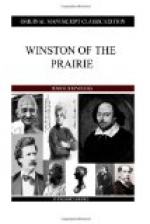CHAPTER XX
COURTHORNE BLUNDERS
Vance Courthorne had lightly taken a good many risks in his time, for he usually found a spice of danger stimulating, and there was in him an irresponsible daring that not infrequently served him better than a well-laid plan. There are also men of his type, who for a time, at least, appear immune from the disasters which follow the one rash venture the prudent make, and it was half in frolic and half in malice he rode to Silverdale dressed as a prairie farmer in the light of day, and forgot that their occupation sets a stamp he had never worn upon the tillers of the soil. The same spirit induced him to imitate one or two of Winston’s gestures for the benefit of his cook, and afterwards wait for a police trooper, who apparently desired to overtake him when he had just left the homestead.
He pulled his horse up when the other man shouted to him, and trusting in the wide hat that hid most of his face, smiled out of half-closed eyes when he handed a packet.
“You have saved me a ride, Mr. Courthorne. I heard you were at the bridge,” the trooper said. “If you’ll sign for those documents I needn’t keep you.”
He brought out a pencil, and Courthorne scribbled on the paper handed him. He was quite aware that there was a risk attached to this, but if Winston had any communications with the police, it appeared advisable to discover what they were about. Then he laughed, as riding on again he opened the packet.
“Agricultural Bureau documents,” he said. “This lot to be returned filled in! Well, if I can remember, I’ll give them to Winston.”
As it happened, he did not remember, but he made a worse mistake just before his departure from the railroad settlement. He had spent two nights at a little wooden hotel, which was not the one where Winston put up when he drove into the place, and to pass the time commenced a flirtation with the proprietor’s daughter. The girl was pretty, and Courthorne a man of different type from the wheat-growers she had been used to. When his horse was at the door, he strolled into the saloon where he found the girl alone in the bar.
“I’m a very sad man, to-day, my dear,” he said, and his melancholy became him.
The girl blushed prettily. “Still,” she said, “whenever you want to, you can come back again.”
“If I did would you be pleased to see me?”
“Of course!” said the girl. “Now, you wait a minute, and I’ll give you something to remember me by. I don’t mix this up for everybody.”
She busied herself with certain decanters and essences, and Courthorne held the glass she handed him high.
“The brightest eyes and the reddest lips between Winnipeg and the Rockies!” he said. “This is nectar, but I would like to remember you by something sweeter still!”
Their heads were not far apart when he laid down his glass, and before the girl quite knew what was happening, an arm was round her neck. Next moment she had flung the man backwards, and stood very straight, quivering with anger and crimson in face, for Courthorne, as occasionally happens with men of his type, assumed too much, and did not always know when to stop. Then, she called sharply, “Jake!”




